Souri's Relief Riders in Rajasthan
Let the eulogies and the travelogue wait; let’s begin with happiness and defiance. No, I am no Nietzsche defying God, I just want to defy litterateur Graham Greene who vociferously refutes that one man can arrange another’s happiness. “No one can arrange another’s happiness”: That’s ripped straight out of the sepia pages of The Heart of the Matter. Ah! Mr Greene, you stand corrected. Happiness can be arranged. But how would you know? You missed travelling with Alexander Souri and his Souri's Relief Riders in Rajasthan. You did not stroke the sweat on the taut bodies of the Marwari horses, you did not hear the blessings that an old wrinkled man whispered when Souri gave him goats for sustenance, nor did the tears of a doddering, nearly-blind woman who was treated at a medical camp in an unlamented village fall on your grave Mr Greene. What’s more, you ignored Souri’s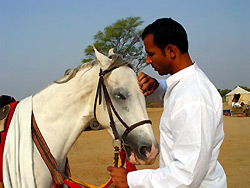 heartbeat when a little, unkempt school kid gave him flowers and said a hushed ‘thank you.’ You missed it all Mr Greene. Another person’s happiness can be arranged. I saw Alexander Souri do that. Just that you weren’t there Mr Greene. Bad luck!
heartbeat when a little, unkempt school kid gave him flowers and said a hushed ‘thank you.’ You missed it all Mr Greene. Another person’s happiness can be arranged. I saw Alexander Souri do that. Just that you weren’t there Mr Greene. Bad luck!
Forget happiness, you also missed the fun – riding on honey-colored horses that had rumps like planets, staying like Neanderthals in tents and behaving like royalty in ancient forts, you missed walking barefoot on the silken sand to watch the ants plod, the spiders web an orb at night and the cacti crack the earth, you missed picking marigolds and loofahs from the wild, you would have loved the sumptuous meals and your jaw would have fallen when the fire-eater ate, well, fire.
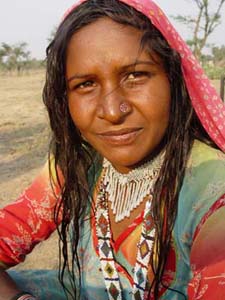
All right, all right, there were scary moments too – when the marauding blue bulls came too close to the lake where the tents were pitched, when the sandstorm nearly blew our tents away and when the camel cart went wayward and I was stranded in the middle of nowhere. That also happened. I twitched my back pushing the jeep off the stubborn sand and when my expensive Nike broke its seams, I tied its flapping sole with long dry grass. That also happened. I also heard the rumble from the camel’s rear – believe me, it is pretty raucous and smelly!
It all happened when I travelled with the Relief Riders (www.reliefridersinternational.com). It all began with one man’s dream, a man from Great Barrington, Massachusetts, who has worked on the special effects of The Matrix and X-Men, has produced promotional films in China and managed special events for Cannes, Sundance and Venice film festivals. That man is called Alexander Souri, he is the founder-director of Relief Riders International (RRI); he also has deep-set eyes and that rich baritone in his voice. He had all the necessary glitter in life, but when his father died he rummaged his soul for answers, he wanted to give back, to pay a tribute to his father and his country, India. And one day he found an alibi to repay Heaven for its blessings when he founded RRI and conceived of the unique adventure plus relief combo, an itinerary not many have scrolled before.
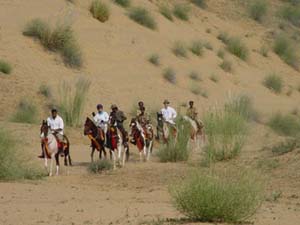
The dream turned into a caper one October morning on the porch of New Delhi’s Imperial Hotel, when the autumn’s yellow lay unfeigned, the sun was solicitous and bags were tagged, counted and dumped on a small bus. Yes, there were the riders from the US and France – a strapping horse-whisperer, a perky interior decorator, a solemn lawyer, a groggy photographer, a sincere ayurveda doctor and stringing the people and logistics was an indefatigable Souri. In between stood I in a red dungaree trying to decipher and partake in the conversation that flowed in accented English, French, Tamil, Hindi and the dialect of the chauffeur, the banter shifting from Falabella horses, marriage, rowdy kids and the zen of motorcycle maintenance.
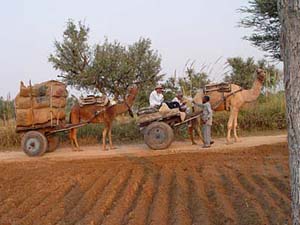
We were on our way to Mukundgarh, our first stop, some 200 miles away. On way images and colors flitted past – women with their heads covered, curious men waving hurriedly, children carrying sunshine in their eyes, the brown of the hillocks and the silver of the thorns. After six hours and several villages we reached the 200-year Mukundgarh Fort that has lime doors and turquoise chandeliers. The burly, sunburned walls of the Fort are laden with frescoes and in the courtyard an old cannon sits like an old maid lamenting the lost grandeur. In the evening, the riders checked their mounts in the stable that abuts the Fort’s high walls.
The ride began next morning, the horses saddled, the riders in jodhpurs and boots, all slathered with sunscreen. Laurent Millet, the French photographer, and I opted for the unkempt camels over the alluring horses. The camel carts were stacked with relief supplies for the underprivileged and there was just enough space to squeeze in. But who would have thought that hopping into a camel cart would be such an arduous proposition. I put my right foot on the wooden protuberance, slipped and nearly fell. Next time, the camel wriggled and I was back on the ground. Another try: I put my foot on the wood and Millet pulled me into the cart. I sure made a funny sight.
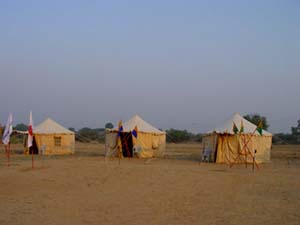
The camel crawled and if I had started to walk, I would have reached the destination much earlier. But when you are on a camel cart trudging on mud roads slim as a twig, destination can be elusive. The riders on horseback, the cooks in an open jeep and we in the camel cart were supposed to meet in a tiny orchard some 20km away for lunch. But lunch was not to be. The mud road took us way off the destination. Millet and I were lost in the middle of a village where there were no phone booths and the cell phones lay dead. Standing on a crossroad I flagged down a vehicle and requested three menacing looking strangers wearing ear studs to take me to the nearest phone booth. The phone was not working and I sat there on the wooden bench looking greedily at the sweetmeats.
After much effort and several prayers to the phone, the rescue vehicle arrived and we just about made for lunch in the tiny orchard. A hearty lunch and I was back on the camel cart to another village where we were supposed to camp in tents in an open desert. The moon shone, the owls howled, we could hear our own heartbeats. The walkie-talkie got cranky and we got lost again. The camel cart rider ran to the nearest hut for directions, the walkie-talkie finally beeped and we reached the camping ground where a bonfire lit the dark night.
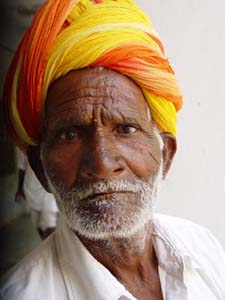
The campsite looked stunning and it had all one could ask for: water being heated in gigantic copper pots, food being cooked in a nearby tent, bottled water, bonfire for warmth, soup for revival of spirits and a caravan with flush toilets. The cell phones weren’t working, there was no electricity but nobody whined. Alexis Ruffat, the French army commando spun tales, Alice read read Amy Tan, Karen Cedar scribbled in her journal, Millet fiddled with his Hasselblad and Souri caressed his favorite horse and smiled at the unfolding of his dreams.
Each day we travelled for around five to six hours from one village to another, the temperature making the sartorial decisions: white in the mornings and light jackets at night. In Khirod and Danta villages, hundreds of people turned up for free medical checkups and medicine, a largesse that the dusty village had not seen before. At a school in Kochor village, children who received sports and educational goods played with their new toys. On the map they looked for Massachusetts, the home of the man who had flown thousands of miles to bring smiles and sunshine into their lives. For the riders, it was an experience they had never lived before, though most of them had seen poverty in Third World countries. For Souri, it was his own way of keeping hope alive in a time of war and geopolitical instability.
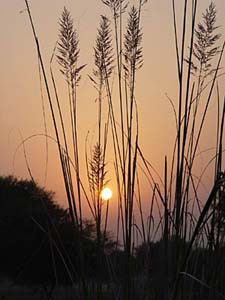
I spent eight days with the Relief Riders and got back home in a rickety bus. I brought home some fragrant wildflowers that I had picked from the mud-spattered roads, I carried the scar that an audacious thorn had etched on my forehead, I gathered the sand from the hem of my skirt and put them in a porcelain urn. And within the sepia pages of The Heart of the Matter, I boldly stuck a handwritten note: One can arrange another person’s happiness, Mr Greene. I saw Alexander Souri do it in Rajasthan. Don’t you wish you had traveled with the Relief Riders, Mr Greene? Come, they will be in Rajasthan in February and in the Himalayas in August. Just make a promise – rearrange your idea of happiness.
Coming up:
Ride through Rajasthan, February 25 – March 10, 2005
Ride around the Himalayas: July 31 – August 15, 2005
To participate contact:
Alexander Souri
info@reliefridersinternational.com
www.reliefridersinternational.com
